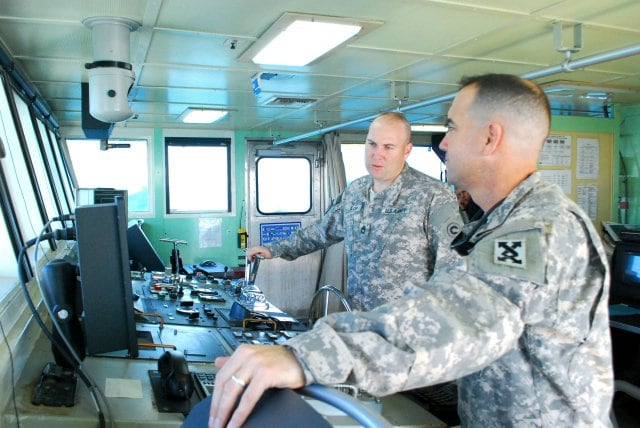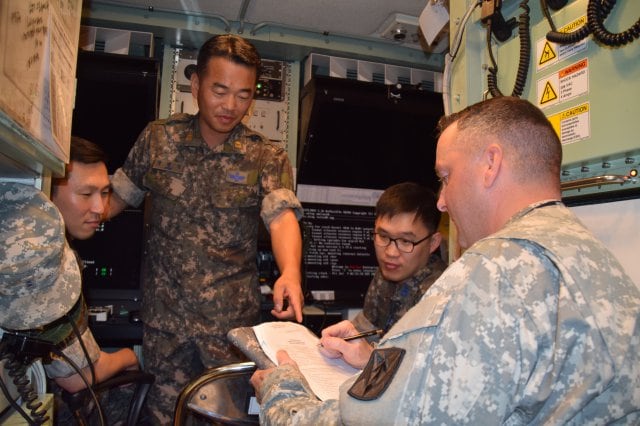The Army National Guard is offering up to $20,000 to qualified candidates as it struggles to fill its warrant officer ranks, losing to retirement almost as many warrants as it is bringing in every year.
The Guard is focused on recruiting for 39 career fields in particular and has opportunities across the 54 states and territories.
"As a warrant, you are the technical expert in your field," said Maj. Carol Stahl, deputy accessions branch chief for the Army Guard. "If you really love what you're doing and want to keep doing that, being a warrant officer is really for you. When a warrant officer speaks, people listen."
The Army Guard has about 8,570 warrant officers in its ranks today; it is authorized more than 10,400. As of January, more than 3,800 of the Guard's warrant officers, or about 44 percent, were eligible for retirement.
Part of the issue is the need for experienced, technical experts, she said. The other issue is attrition, as the vast majority of warrant officer candidates serve as enlisted soldiers before making the switch.
"It's an older population, so we have a lot of guys who are up for retirement," she said. "The number of warrant officers we're bringing in is being offset by people getting out or retiring."
So far this fiscal year, which started Oct. 1, the Guard has brought in 242 warrant officers but lost 232, said Chief Warrant Officer 2 Darrell Beal, who works in the Army Guard's warrant officer accessions section.
The previous year, fiscal 2015, the Guard brought in 573 new warrants but lost 622.
"We're always encouraging states to overdrive the [recruiting] mission if possible," Stahl said, adding that the Guard also is challenged by geography and finding the right candidate for the right job or unit.
To help meet its needs, the Guard is seeking applicants from within but also soldiers transitioning from the active Army as well as service members from the other services.

Chief Warrant Officer 2 Tom Heald, right, speaks to Sgt 1st Class Daniel Close. Heald is the skipper of the U.S. Army vessel Kennesaw Mountain, a Landing Craft Utility. The Army National Guard is seeking qualified warrant officer candidates, including those who can be marine deck officers.
Photo Credit: Cpl. Jeffrey Daniel/Army
Here's what you need to know to decide if going warrant is right for you.
Should I apply?
Warrant officers who are leaving the active Army and decide to join the Guard can receive a $20,000 affiliation bonus in exchange for a three-year commitment. The service commitment doubles to six years if the warrant officer chooses to switch career fields and needs further training.
Enlisted soldiers from the regular Army who leave active duty to join the Guard and go warrant are eligible for a $20,000 accession bonus in exchange for a six-year commitment.
If you're already in the Guard and decide to go from enlisted to warrant, you also can earn up to $20,000; the money is paid after you complete MOS-specific training and sign up for six more years.
Becoming a warrant officer also provides soldiers with highly specialized training in their chosen field, which could translate into enhanced civilian career opportunities after the Army.
What are some of the other benefits?
Warrant officers make more money than enlisted soldiers.
A sergeant with more than eight years of service makes $398.64 every drill weekend. A warrant officer 1 with eight years of service makes $533.28.
An E-5 with more than 10 years of service makes $419.68, while a WO1 with the same time in service makes $552.56.
This does not include the additional pay soldiers receive during their two-week annual training.
Warrant officers also have healthy promotion rates.
"Promotion rates up to CW4 are virtually a lock based on vacancies," Stahl said.
In the Guard, promotions up to CW4 are unit vacancy based and are almost guaranteed once the officer is in good standing and meets the time in grade and military education requirements.
Unlike the active Army or Army Reserve, Guard warrants don't compete against peers for promotion by a selection board.
In addition, a sergeant first class with two years of time in grade who makes the switch to go warrant is automatically promoted to CW2 upon completion of his or her training.
Candidates also are eligible to state-specific education and veteran benefits.

The Army National Guard is seeking qualified warrant officer applicants for 39 career fields, including petroleum systems technicians.
Photo Credit: Sgt. Richard Wrigley/Army
Who are they looking for?
The Guard is looking for candidates from within its organization but also soldiers transitioning from the active Army and service members from all of the other services.
"Of course we're always looking for warrant officers within our own ranks, but we just can't fill our ranks with just our in-service guys. There's just not enough of them," Stahl said.
The Guard hopes that its numerous hometown locations across the country is a draw for service members leaving active duty.
"If you decide to get off active duty, you're probably going to go back to where your family is from or where you can get a job," Stahl said.
As for candidates who have served in the Air Force, Navy or Marine Corps, the Guard is "absolutely interested in them as long as they're qualified," Stahl said.
"Sometimes you don't have a one-for-one match on our [military occupational specialties], but sometimes you do," she said.
The Guard will review records for all applicants to see if they qualified, she said.
Where are the shortages?
The Guard is seeking candidates for all military occupational specialties, but it is focusing on 39 in particular.
One of specialties with the biggest shortages is military intelligence. Cyber is another, Stahl said.
Other critical areas are air defense artillery, signal and electronic warfare, Beal said.
Here is the full list, by MOS:
• 120A: Construction engineering technician
• 125D: Geospatial engineering technician
• 131A: Field artillery targeting technician
• 140A: Command and control systems technician
• 140E: Air and missile defense tactician/technician (Patriot systems technician)
• 150A: Air traffic control technician
• 150U: Tactical unmanned aerial systems operations technician
• 170A: Cyber operations technician
• 180A: Special Forces warrant officer
• 255A: Information services technician
• 255N: Network management technician
• 255S: Information protection technician
• 255Z: Cyberspace network operations technician
• 270A: Legal administrator
• 290A: Electronic warfare technician
• 350F: All-source intelligence technician
• 350G: Geospatial intelligence imagery technician
• 351L: Counterintelligence technician
• 351M: Human intelligence collection technician
• 352N: Signals intelligences analysis technician
• 353T: Military intelligence systems maintenance/integration technician
• 420A: Human resources technician
• 670A: Health services maintenance technician
• 740A: Chemical, biological, nuclear and radiological technician
• 880A: Marine deck officer
• 881A: Marine engineering officer
• 882A: Mobility officer
• 890A: Ammunition warrant officer
• 913A: Armament systems maintenance warrant officer
• 914A: Allied trades warrant officer
• 915A: Automotive maintenance warrant officer
• 919A: Engineer equipment maintenance warrant officer
• 920A: Property accounting technician
• 920B: Supply systems technician
• 921A: Airdrop systems technician
• 922A: Food service technician
• 923A: Petroleum systems technician
• 948B: Electronic systems maintenance warrant officer
• 948D: Electronic missile systems maintenance warrant officer

Chief Warrant Officer 3 Ronald Brotherton, 35th Air Defense Artillery Brigade, evaluates training objectives during an exercise in South Korea. The Army National Guard is seeking air defense artillery specialists who want to become warrant officers.
Photo Credit: Staff Sgt. Heather A. Denby/Army
How do I apply?
For the full list of requirements, go to http://www.usarec.army.mil/hq/warrant/.
Key requirements include:
• U.S. citizenship.
• A General Technical score of 110 or higher.
• A high school diploma or GED.
• The ability to obtain a secret clearance or better, which varies by career field.
• Ability to pass the Army Physical Fitness Test and the commissioning physical.
• At least 12 months remaining on your enlisted contract at the time of application.
For specific information about serving as a warrant officer in the Guard, go to http://www.usarec.army.mil/hq/warrant/WONationalGuard.shtml.
Active Army enlisted soldiers and warrant officers interested in learning more should contact the Reserve Component Career Counselor at their installation for more information.
All other interested candidates also should talk to their state, territory or District of Columbia warrant officer strength manager. To find a warrant officer strength managers, go to http://www.nationalguard.com/contacts/wosm.
Michelle Tan is the editor of Army Times and Air Force Times. She has covered the military for Military Times since 2005, and has embedded with U.S. troops in Iraq, Afghanistan, Kuwait, Haiti, Gabon and the Horn of Africa.




